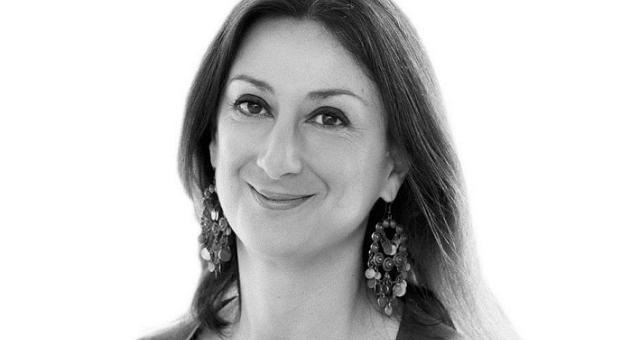18 Oct 2017 | Statements
Anti-corruption activists, press freedom advocates and investigative journalists from around the world condemn the barbaric murder of Daphne Caruana Galizia, an investigative journalist from Malta who courageously exposed organised crime and corruption in politics.
Only when corruption is uncovered can action be taken to hold criminals to account. Anti-corruption activists work side-by-side with investigative journalists to shine a light into the dark world of corruption and advocate action to end impunity.
We call on the authorities in Malta to bring the perpetrators of this crime to justice. Those who expose corruption must be protected, not intimidated.
Caruana Galizia’s work included exposés of the shady secret deals, uncovered in the Panama Papers, that show how politicians and others hide illicit wealth behind secret companies.
Our thoughts are with her family.
“My mother was assassinated because she stood between the rule of law and those who sought to violate it, like many strong journalists. But she was also targeted because she was the only person doing so,” said Matthew Caruana Galizia, developer and data journalist at ICIJ.
Signed by:
Article 19
The Association of European Journalists
Civil Liberties Union for Europe
Committee to Protect Journalists
English PEN
Finance Uncovered
Global Witness
Index on Censorship
International Press Institute
International Women’s Media Foundation
P24, platform for independent journalism (Istanbul, Turkey)
PEN International
PEN South Africa
Reporters Without Borders
Transparency International
18 Oct 2017 | Campaigns -- Featured, Malta, media freedom featured, Statements
[vc_row][vc_column][vc_column_text]

Daphne Caruana Galizia
Sixteen press freedom groups condemn the killing of investigative journalist Daphne Caruana Galizia and demand an immediate and independent investigation into her death.
“The murder of a prominent investigative journalist in broad daylight in an EU Member State underscores the seriousness of this crime. Daphne Caruana Galizia’s work as a journalist to hold power to account and shine a light on corruption is vital to maintaining our democratic institutions. Her killing is a loss for her country and for Europe”, Hannah Machlin, project manager for Index on Censorship’s data platform Mapping Media Freedom, said.
Daphne Caruana Galizia was killed when the car she was driving exploded in Bidnija around 15.00 on 16 October in what is thought to have been a targeted attack..
“The barbaric murder of Daphne Caruana Galizia is an attack on journalism itself. This crime is meant to intimidate every investigative journalist,” Dr Lutz Kinkel, Managing Director of the European Centre for Press and Media Freedom, said.
“Because Prime Minister Joseph Muscat and parts of Malta’s political elite were targets of Galizia’s disclosures, we strongly recommend an independent investigation of this case. The killers have to be found and put on trial.”
The blast left her vehicle in several pieces and threw debris into a nearby field. Half an hour before the powerful explosion, the journalist posted a comment about a libel claim the prime minister’s chief of staff had brought against a former opposition leader over comments the latter made about corruption.
Galizia filed a police report 16 days ago saying she was being threatened.
Galizia had conducted a series of high profile corruption investigations and has been subject to dozens of libel suits and harassment. Because of her research, in February, assets were frozen following a request filed by Economic Minister Chris Cardona and his EU presidency policy officer Joseph Gerada.
On 24 August opposition leader Adrian Delia filed a lawsuit against her over stories linking him to offshore accounts totalling to £1 million earned from alleged prostitution in London flats. On 11 March Silvio Debono, owner of the real estate investment company DB Group, filed 19 libel cases against her after Caruana Galizia published a number of articles about his deals with the Maltese government to take over a large tract of high value public land.
Galizia also conducted an investigation linking the Prime Minister Joseph Muscat and his wife Michelle to secret offshore bank accounts to allegedly hide payments from Azerbaijan’s ruling family, which were unveiled in the Panama Papers. She worked on this investigation with her son Matthew Caruana Galizia, a journalist for the Pulitzer prize winning International Consortium of Investigative Journalists, who has had his posts on allegations of wrongdoing by Prime Minister Joseph Muscat and his associates censored on Facebook.
On 17 October 2017, her family filed an urgent application for the Duty Magistrate Consuelo Scerri Herrera to abstain from investigating Caruana Galizia’s murder because of the court’s “flagrant conflict of interest”. In 2011, the magistrate initiated court proceedings against the journalist over comments she had made about Magistrate Herrera.
Seven reports of violations of press freedom were verified in Malta in 2017, according to Index on Censorship’s Mapping Media Freedom project. Five of those are linked to Caruana Galizia and her family.
The murder has brought widespread condemnation from the international community including statements from Council of Europe Secretary General Thorbjørn Jaglan and OSCE’s Media Freedom Representative Harlem Désir.
We, the undersigned press freedom organisations call for:
— An independent and transparent investigation into the killing of Daphne Caruana Galizia
— Protection for her family members and for other Maltese journalists who have been under threat
— Measures to protect the environment for independent and critical journalism to ensure that reporters can work freely
———————————————————————
Article 19
The Association of European Journalists (AEJ)
The Center for Investigative Reporting
Committee to Protect Journalists
The European Centre for Press and Media Freedom
The European Federation of Journalists (EFJ)
Freedom of the Press Foundation
Index on Censorship
International News Safety Institute (INSI)
International Federation of Journalists (IFJ)
International Press Institute (IPI)
Osservatorio Balcani e Caucaso Transeuropa (OBCT)
Ossigeno per I’nformazione
Platform of Independent Journalism (P24)
Reporters Sans Frontieres (RSF)
South East Europe Media Organisation (SEEMO) [/vc_column_text][/vc_column][/vc_row][vc_row][vc_column][vc_basic_grid post_type=”post” max_items=”12″ style=”load-more” items_per_page=”4″ element_width=”6″ grid_id=”vc_gid:1508321261018-6a10a188-6c0b-6″ taxonomies=”8996″][/vc_column][/vc_row]
17 Oct 2017 | Europe and Central Asia, Malta, Mapping Media Freedom, Media Freedom, media freedom featured, News and features
Daphne Caruana Galizia was a Maltese journalist and blogger known for her investigative reporting on controversial and sensitive information.
Fifteen days after filing a police report that she was being threatened, Caruana Galizia was killed when the car she was driving exploded.
“We strongly condemn the violent killing of investigative journalist Daphne Caruana Galizia. We urge the Maltese authorities to swiftly and thoroughly investigate the circumstances to bring the perpetrators to justice,” Hannah Machlin, project manager of Mapping Media Freedom, said.
Caruana Galizia ran her own news blog, Running Commentary. The site sometimes attracted as many as 400,000 readers a day (Malta’s population is just around 420,000). Her blog relentlessly exposed corruption among Malta’s politicians. It became the focal point of many legal battles, including multiple libel suits.
In August 2017, opposition leader Adrian Delia filed a lawsuit against Caruana Galizia over stories linking him with offshore accounts connected to sex work in London. She accused Delia of money laundering, claiming that around £1 million earned from prostitution in London flats was being processed through Delia’s Barclays International account in Jersey. Delia filed five libel suits against Caruana Galizia.
Caruana Galizia also published a series of articles accusing Silvio Debono, owner of real estate investment company DB Group, of making a deal with the Malta government to take over a huge area of public land to build a Hard Rock Hotel and two towers of flats for sale. In March 2017 Debono filed 19 libel cases against Caruana Galizia.
When Galizia reported in February that Economic Minister Chris Cardona and EU presidency policy officer Joseph Gerada visited a brothel in Germany while on official business, four precautionary warrants froze her assets. Each politician also filed two civil suits against her.
In January 2016, lawyers requested that Caruana Galizia reveal confidential sources, one of which claimed that the energy minister was seen kissing his communications coordinator. The minister’s lawyers questioned her “professional capacity as a journalist”.
Caruana Galizia was the first to report that Malta’s government minister Konrad Mizzi and chief of staff Keith Schembri were connected to the Panama Papers leak. Her involvement in history’s biggest data leak named her among Politico’s “28 people who are shaping, shaking, and stirring Europe”.
In March 2013 she was arrested for discussing politics on the internet during “day of silence,” a day in which no one in Malta is allowed to publish anything that may have an effect on voters or voters’ intentions. On her blog post recounting the experience: “It was obvious to me that they had come with a warrant of arrest to have an excuse to keep me locked up until tomorrow and away from the internet, literally physically preventing me from writing.”
Caruana Galizia was born in Sliema on the northeast coast of Malta in 1964. She attended the University of Malta and graduated BA in archaeology in 1997. She began her career as a columnist for the Sunday Times of Malta in 1987 and later became the Associate Editor of The Malta Independent.
One of her sons, Matthew Caruana Galizia, was part of the team that broke the Panama Papers.
16 Oct 2017 | Europe and Central Asia, Malta, media freedom featured, Statements

Daphne Caruana Galizia
Maltese journalist Daphne Caruana Galizia was killed on Monday afternoon 16 October when her car exploded shortly after she left her house.
“We strongly condemn the violent killing of investigative journalist Daphne Caruana Galizia. We urge the Maltese authorities to swiftly and thoroughly investigate the circumstances to bring the perpetrators to justice”, Hannah Machlin, project manager of Mapping Media Freedom, said.
Galizia was recently threatened according to TVM.
Galizia was sued in March 2017 by a property developer who filed 19 libel cases against her. In February 2017, economic minister Chris Cardona and his EU presidency policy officer Joseph Gerada filed four libel suits against the journalist.
Galizia had also conducted investigations linking Malta’s prime minister, Joseph Muscat and his wife Michelle, to secret offshore bank accounts revealed by the Panama Papers.


